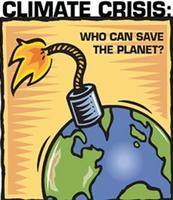Climate Crisis: Who Can Save the Planet?
The failure of the Copenhagen Climate Conference leaves the world wondering how to resolve the environmental crisis—Nature has the remedy
The Copenhagen Climate Conference failed at its mission to save the planet from global warming. The sole result of this two week global summit was a weak accord that has no teeth to stave off greenhouse gases; voting members merely conceded “to take note” of the recommendations. Danish Prime Minister Lars Rasmussen, designated to lead the summit after the conference president resigned on the opening day, implored the delegation to action by pointing out, “People around the world [are] actually expecting something to be done from us.”
Rasmussen’s plea, far from eliciting the desired outcome, smacks of an all-too-tragic comedy that the proceedings proved to be. The conference which was billed as the “last, best chance to save the environment” was criticized, among other things, for the 1200, high-carbon footprint limousines brought in from as far as Germany and Sweden to transport the climate-conscious delegates to and from the conference.
Comparisons to efforts made to save the global financial system were noted in the French newspaper Libération, “We must make the bitter observation: when it comes to rescuing the banking system, the dialog has been far more effective and determined.” Hugo Chavez, Venezuela’s president, succinctly summed it up, “If the climate was a bank they would have saved it.”
The world’s oldest scientific institution, the Royal Society professes that the summit’s failure has brought the world “one step closer to a humanitarian crisis.” If those designated to save the planet have failed, and the ecological crisis, as it is widely observed, is only getting worse, it begs the question: Who can save the planet?
The Nature of the Problem
To find the answer, we can look to nature and at the true nature of the problem. Taking a broad view, we must first recognize that nature is not the sum of all the minerals, plants, and animals on the planet. Nature, rather, is a principle of mutual balance that defines the detailed relationships of everything in existence.
An illustration of the natural relationship of mutual balance is the complex of biological systems within us. 10 trillion cells work together for the purpose of sustaining the aggregate of the cells, our bodies.
Nature cannot help but act in a mutual and harmonized balance. Creatures in nature take from the environment only what they need for survival, and they work together for the benefit of the herd, flock, pride, or school. Why are humans the only species on the planet who disrupt this balance? The human being is the only creature who enjoys accumulating more than others and more than he needs, who uses the environment for excessive gain, and desires to dominate nature. This follows from man’s desires for not only food, shelter, and family, but also for wealth, power, fame, and honor.
These attributes, which are exclusively in the domain of man, are what produce the imbalance with and in nature. When we look behind all the systems created by man, we see one force: the ego. Humans are driven by their personal self-interest rather than the consideration of what is best for all. This is the breakdown in the relationship with nature and what causes problems for us and the environment.
The Way Back to Balance
Humans seem to view nature as if we are above it, and not a part of it. But we are an integral part of the global system of nature, which is a single, interconnected system. When man causes a disruption in the natural harmony in the planet, it ripples throughout and throws the entire system off-balance. This is why even if the Copenhagen conference had been successful, it still would fall short of really saving the planet. It still misses the point; instead of dealing with the results of the problem, like attempting to curtail greenhouse gas emissions, we must address the root of the problem.
The way to save the environment is to rebalance nature at the level where the imbalance occurs, at the level of the relationships between people. Nature most broadly is the principle of mutual balance that guides the detailed relationships of everything in existence. Humans self-interestedly dominate the environment and other humans. If instead, we adopt an attitude of consideration of the whole of humanity and the planet, we will save both.
Everything else in nature operates by this natural law. When we begin, one by one, to start internalizing the perspective of our truly being interconnected and the need to tend to that relationship with all, we create a relationship of mutual interest between us; and we will balance ourselves with nature, creating harmony and peace for our planet.
The answer for saving the planet is truly in our hands, hearts, and minds.
